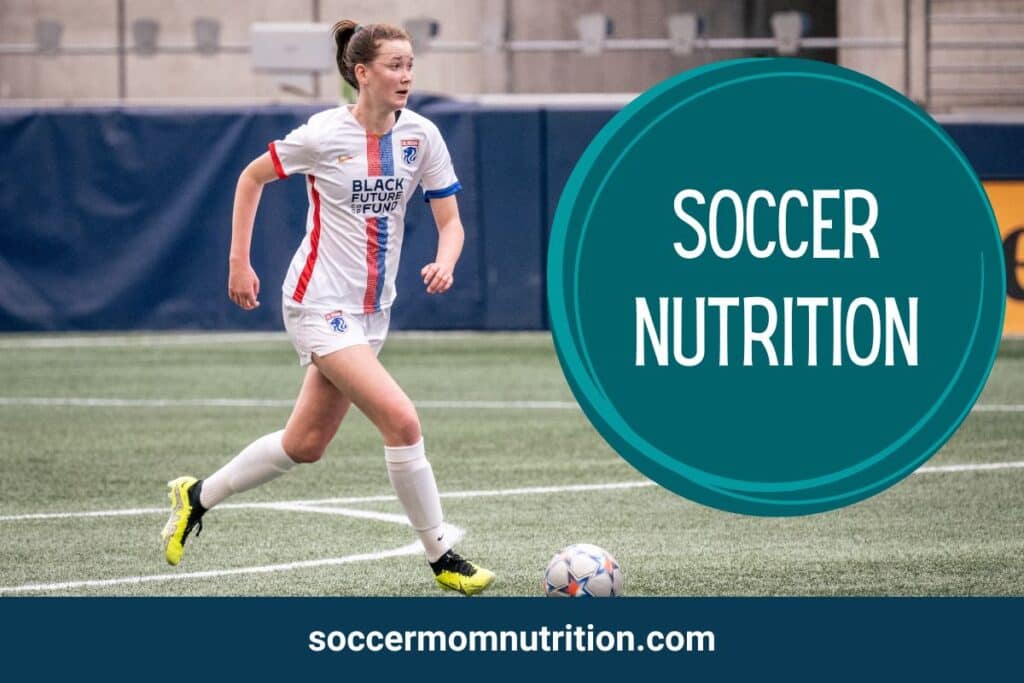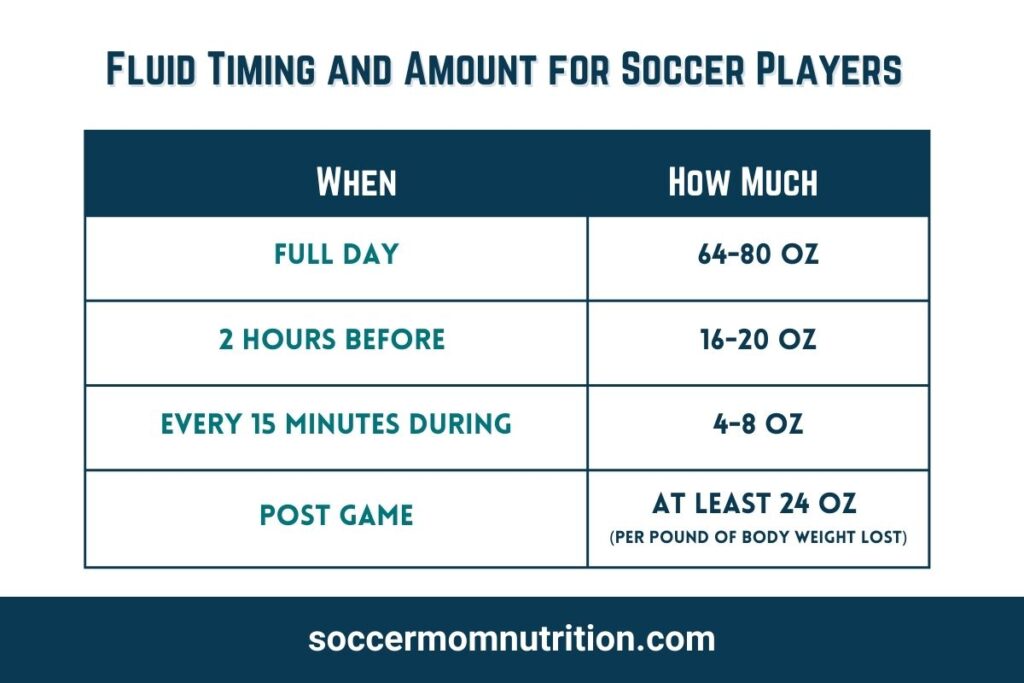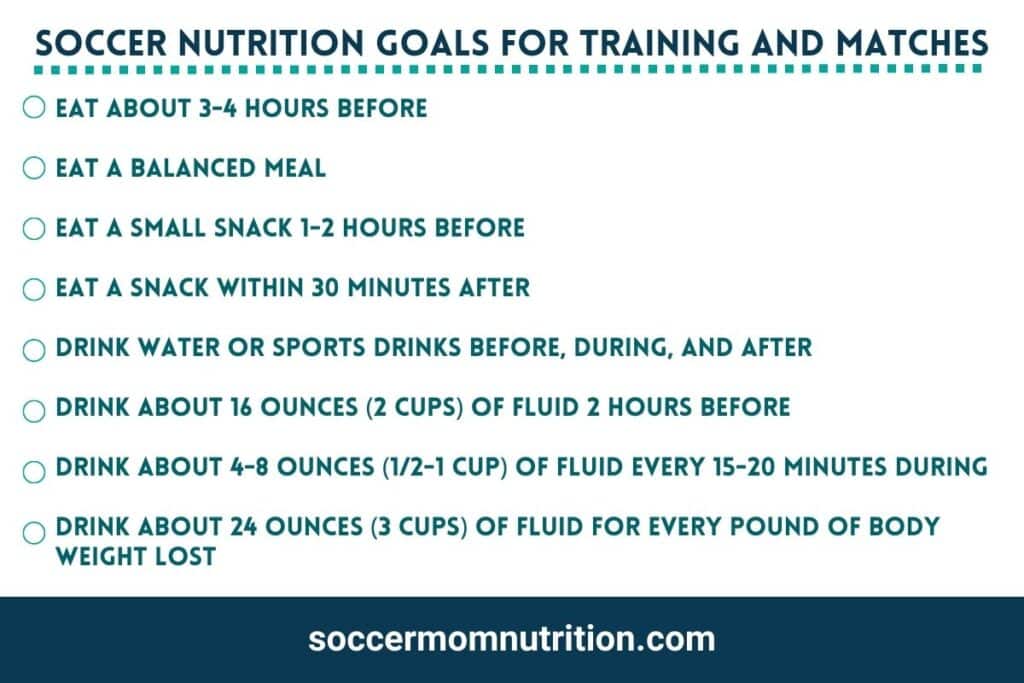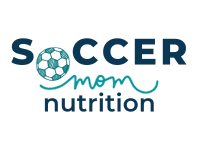Soccer Nutrition: How to Fuel Your Performance on the Field
If you are a soccer player who wants to improve your game, you need to pay attention to your soccer nutrition.
A soccer player diet is different from other sports because of the unique physical demands of the game. (1) Soccer players need a lot of energy to keep up with the running, jumping and kicking required in the sport.
You also need to maintain your power, strength and endurance throughout a match, which can last up to 90 minutes. In fact soccer players run between 3-7 miles during practices and games (2).
What you eat and drink before, during and after your training sessions and matches can make a big difference in how you feel and perform on the field. (3)
In this post, we will explain the basics of soccer nutrition for youth athletes, and give you some tips and examples of how to build the best soccer player diet.
This includes what to eat and drink to fuel your performance before, during and after a game or practice.

Please note that this article contains affiliate links. If you click one of these links and make a purchase, we may earn a commission. As an Amazon Associate, we earn from qualifying purchases.
Why is soccer nutrition important
Soccer nutrition is important for soccer players because how you fuel affects the energy you have in your muscles, your concentration and focus, energy levels, muscle recovery and hydration.
Energy levels: Soccer players need enough carbohydrates to provide energy for their muscles and brain. Your muscles store carbohydrates as glycogen.
Carbohydrates are the main fuel source for high-intensity activities like sprinting, dribbling and shooting.
If you don’t eat enough carbohydrates, your glycogen stores will be low and you will feel tired and sluggish on the field and unable to perform your best.
Fat is also a source of energy for soccer players, especially during low-intensity activities like jogging or walking. Fat also helps absorb vitamins and minerals, protect organs, and regulate body temperature.
However, not all fats are created equal.
You should limit saturated fats and trans fats that can raise your cholesterol levels and increase your risk of heart disease.
Instead, choose healthy fats like olive oil, nuts, seeds, avocado and fatty fish.
Muscle recovery: Soccer players need enough protein to repair and rebuild their muscles that gets damaged after training and matches. Protein also helps prevent muscle breakdown and soreness.
Another role for protein is regulating hormones, enzyme, and immune system function.
Without enough protein, soccer players may experience muscle loss, weakness, and increased risk of injury.
Hydration: Soccer players need enough fluids to prevent dehydration and heat illness. Fluids help regulate body temperature, transport nutrients and oxygen and remove waste products.
When you don’t drink enough fluids, you may experience symptoms of dehydration including headaches, cramps, nausea, dizziness and impaired performance.

How much should soccer players eat and drink
The amount of calories and nutrients you need depends on several factors, such as your age, gender, weight, height, activity level and goals.
As a general rule, youth soccer player diets have more calories than your less-active peers to fuel your sport performance and their growth.
On average, active teenage boys need 3,000 to 4,000 calories a day, while active teenage girls need 2,400 to 3,000 calories a day.
To get the most out of your calories, you should aim for a balanced diet that consists of about 55-65% carbohydrates, 20-25% protein and the remaining from fat. This means that you should eat a variety of foods from different food groups every day.
Balance meals and snacks
- Carbohydrates: whole grains (bread, pasta, rice), fruits (bananas, apples, oranges), vegetables (potatoes, carrots, broccoli), dairy (milk, yogurt), beans (black beans, chickpeas)
- Protein: lean meats (chicken, turkey), fish (salmon, tuna), eggs (whole or whites), nuts (almonds, walnuts), seeds (sunflower seeds), soy (tofu)
- Fat: oils (olive oil), nuts (almonds), seeds (flax seeds), avocado (guacamole), fish (salmon)
Set goals for meals, snacking and hydration

When should soccer players eat
Timing is also important when it comes to soccer player diets. You should eat different types and amounts (volume) of foods depending on when you have a game or practice.
Here are some guidelines on what to eat before, during and after a game or practice:
1. Before Activity
You should eat a pre game meal or snack that is high in carbohydrates and moderate in protein and fat about 3 to 4 hours before a game or practice.
This will help fill up your glycogen stores and give you enough energy to last the whole game or practice.
Some examples of pre-game or pre-practice meals or snacks are:
- Turkey sandwich on whole-wheat bread with lettuce and tomato
- Oatmeal with nuts and dried fruits
- Fruit smoothie with yogurt and granola
- Pasta salad with chicken and vegetables
2. During Activity
You should drink water or sports drinks regularly during a game or practice to stay hydrated, replace electrolytes and prevent dehydration.
Dehydration can cause headaches, dizziness, cramps and fatigue, which can affect your performance and health.
You should drink about half a cup of water or sports drink every 15 to 20 minutes during a game or practice. You may also need some carbohydrates during a game or practice if it lasts longer than an hour or if you feel your energy levels dropping.
Some examples of snacks that can provide you with some quick energy during a game or practice are:
- Banana or an orange
- Granola bar or a fig bar
- Handful of raisins or dried cranberries
- Sports gel or a sports chew
- Applesauce
- Pretzels
3. After Activity
You should eat post game meals or post game snack high in carbohydrates and protein and low in fat within 30 minutes after a game or practice. This will help replenish your glycogen stores and repair your muscle tissue.
Some examples of post-game or post-practice meals or snacks are:
- Chicken wrap with whole-wheat tortilla, cheese, lettuce and salsa
- Chocolate milk and a peanut butter sandwich
- Yogurt parfait with granola and berries
- Stir-fry with rice, beef and vegetables
- Pesto pasta with chicken and vegetables
Additionally, if you don’t feel like eating, try drinking chocolate milk, a post game smoothie, tart cherry juice or sports drink to at least begin your recovery.
Good food and drink choices
Here are some examples of good food and drinks for soccer nutrition:
Pre-training or pre-match meal
- Oatmeal with milk, nuts and fruit
- Whole wheat pasta with chicken and tomato sauce
- Turkey sandwich with cheese, lettuce, tomato, and whole wheat bread
- Rice with beans and salsa
- Yogurt with granola and berries
Pre-training or pre-match snack
- Banana with peanut butter
- Pretzels with hummus
- Dried fruits and nuts
- Granola bar
- Cheese stick
Post-training or post-match snack
- Chocolate milk
- Fruit smoothie with yogurt, high protein milk or protein powder
- Turkey wrap with whole wheat tortilla
- Cottage cheese with fruit
- Hard-boiled egg with whole wheat crackers
Fluids
- Water
- Sports drinks
- Tart cherry juice
- 100% fruit juice
- Coconut water
- Chocolate milk
- Smoothies
Rest day nutrition
On rest days, soccer players should still follow a balanced diet that includes carbohydrates, proteins and fats. You may want to adjust their calorie intake based on their activity level to a low activity/rest day performance plate..
It’s also important to stay hydrated by drinking plenty of water throughout the day.
How to optimize your soccer nutrition
Besides following the basic principles of soccer nutrition, you can also optimize your soccer player diet by paying attention to some details that can make a difference in your performance and health.
Basic tips to optimize
Plan ahead and pack healthy snacks and drinks for your games and practices. This will help you avoid skipping meals or relying on vending machines, gas stations or fast food restaurants that may not offer the best choices.
Experiment with different foods and drinks to find out what works best for you. Everyone is different and what works for one person may not work for another.
Try different foods and drinks before, during and after your games and practices and see how they affect your energy levels, digestion, mood and performance.
Monitor your weight, body composition, hydration status and growth. These are some indicators of your soccer nutrition status and health. You should aim for a healthy weight and body composition that supports your sport performance and growth.
And you want to track your growth and make sure you are growing at a normal rate for your age. You also need to drink enough fluids to keep your urine pale yellow or clear.
Consult a registered dietitian who specializes in sports nutrition for more personalized advice.
Summary
Soccer nutrition is essential for building an optimal soccer player diet focused on performance and health.
By eating and drinking the right amounts and types of foods and fluids at the right times, soccer players can boost their energy levels, speed up their muscle recovery and prevent dehydration and heat illness.
Remember to always consult with your doctor or a registered dietitian before making any changes to your soccer player diet or supplement use.
Also check out our post on the 15 best foods for soccer players!
Stephanie Magill, MS, RD, CD, FAND has over 22 years of experience in public health and nutrition. As a performance registered dietitian nutritionist, Stephanie specializes in sports nutrition and provides simple and actionable information so that athletes can be well fueled for high performance on and off the field. Stephanie has a Master’s Degree in Nutrition and is a Fellow of the Academy of Nutrition and Dietetics.

